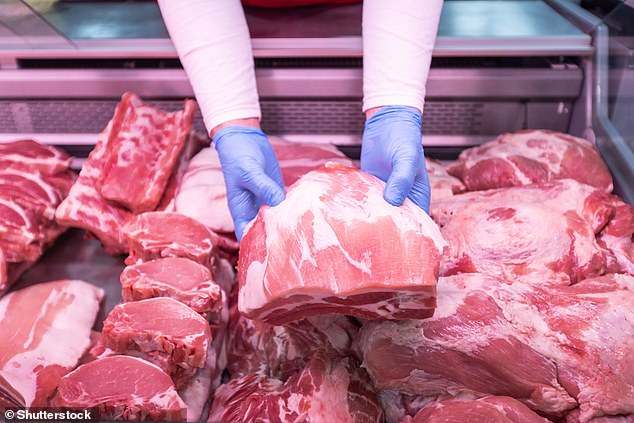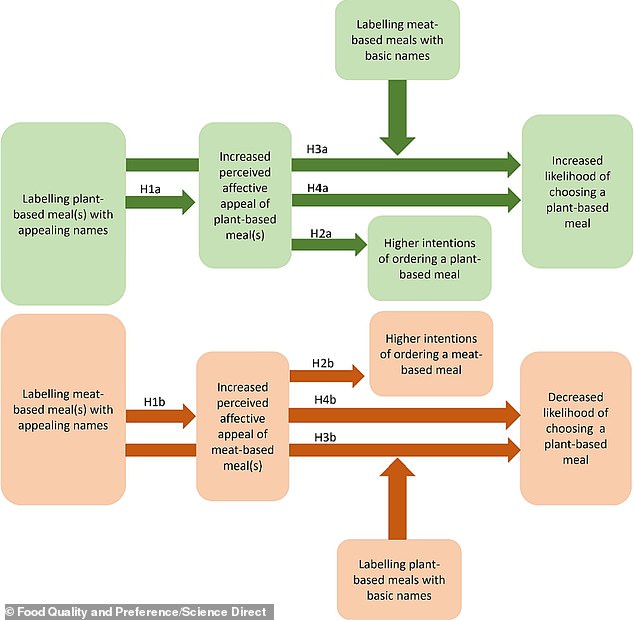Would YOU order one? Scientists claim we should rename vegan burgers ‘Juicy American burgers’ to make them more appealing to meat lovers
>
- More descriptive names can increase the appeal of plant-based foods and help the planet
- Read more: Thousands of students at top UK universities ‘forced to turn vegan’
A “veggie burger” may not sound like the most attractive dish on a menu board.
But a new study suggests that restaurants could sell them by quantity, by giving them more appetizing, descriptive names.
Experts in Australia have found that using names like “Juicy American” or “Smoky Aussie” for plant-based burgers can make people prefer them over their real meat counterparts.
Vegan food companies and restaurants may need to get more creative if they want to encourage meat lovers to reduce their consumption and help save the planet.
Cutting down on animal products can improve our health and the health of the planet, too, as large-scale livestock farming destroys habitats and pumps out carbon dioxide and methane.
Vegan food companies and restaurants may need to get more creative if they want to encourage meat lovers to eat more plant-based foods and save the planet (file photo)
“Changing the names of vegetarian meals on restaurant menus significantly increases the appeal of the food,” said study author Danielle Green from the University of Queensland.
“A simple change like renaming the ‘plant-based burger’ to the ‘Juicy American Burger’ can increase vegetarian orders and encourage meat-eaters to try vegetarian options.”
Researchers say that environmentally friendly meals rich in plant materials tend to be described in restaurants with unattractive names.
In comparison, the language used at the top 100 most profitable U.S. restaurants to describe meat-rich meals is more likely to be described as “American,” “delicious,” or “juicy.” 2017 paper found.
In their new study, the experts wanted to know whether using catchy meal names could convince people to order more vegetarian meals in restaurants.
Through an initial online survey of 537 participants, they identified a range of alternative names for classic Australian pub dishes, such as burgers, lasange and parmigiana.

Reducing our red meat intake could improve our health and the health of the planet too, as large-scale livestock farming destroys habitats and pumps out carbon dioxide and methane (archive image)
The second part of the study involved a simulation of a restaurant experience in which 312 participants ordered one of four meals based on the name assigned to each – either attractive or unattractive.
As expected, the presence of descriptive adjectives in dish names made people more likely to order them, whether the dishes were vegetarian or not.
For example, a “juicy Australian burger” was more tempting than just a “beef burger” or a “veggie burger,” while “tasty Italian vegetable lasagna” was better than just a “veggie lasagna.”
Finally, the third panel included 898 participants, all divided into different groups of meat eaters, who were surveyed on how catchy names influenced their choices.
Overall, the researchers found that dish names that highlight a food’s flavour, texture and place of origin can positively influence the appeal of vegetarian meals.
Most importantly, the meat-eaters chose the vegetarian food with a descriptive name when the name of the meat version was more boring.
But this was not the case in all carnivore groups; For example, “hardcore meat eaters” were less likely to choose the vegetarian option despite the name change.

Researchers found that catchy meal names (compared with basic names) increased the perceived emotional appeal of meals
The team acknowledges that the effect is strongest among meat-eating groups that are considered environmentally or health-oriented.
But this group increasingly makes up a larger and larger proportion of people who eat meat, so the authors hope their findings will have an impact in the real world.
“We conclude that using catchy names for vegetarian dishes on restaurant menus may represent a cost-effective way to entice certain segments of consumers in the market to choose vegetarian dishes rather than meat-based dishes when dining out,” they say.
“With food contributing nearly 25 percent of global emissions, changing meal choices for even the smallest market segments can make a meaningful contribution to mitigating climate change.”
The new study was published in Elsevier magazine Food quality and preferences.
(Tags for translation)dailymail
